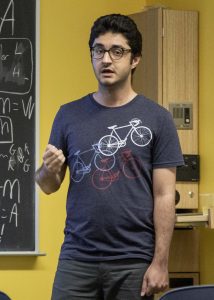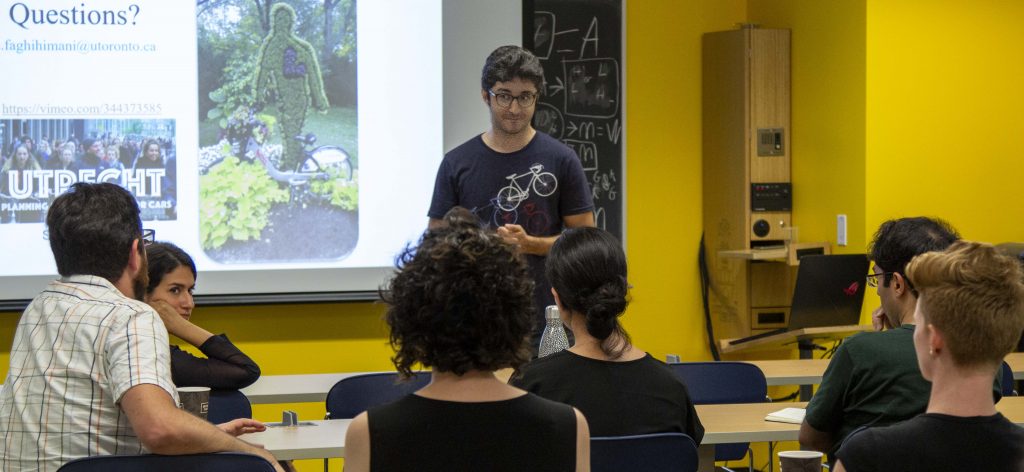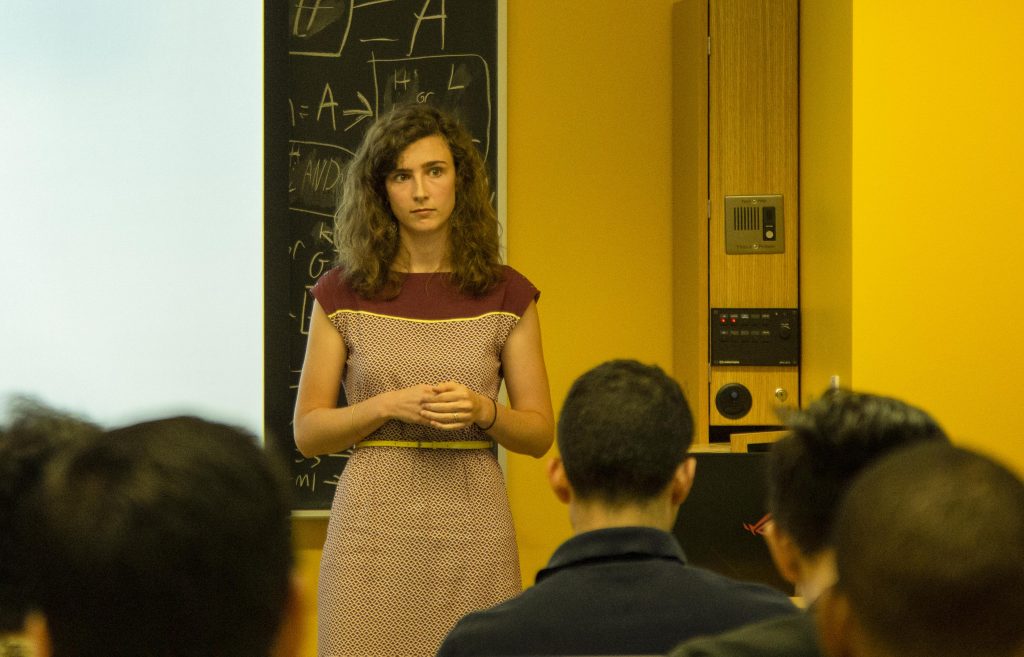Two UTTRI postdoctoral fellows and a PhD candidate spoke July 11 at the Cities By Design: The Future of Urban Mobility series, part of the Urban Challenge Project Seminars presented by the School of Cities in partnership with UTTRI.
Professor Steven Farber warmly welcomed the crowd and introduced the speakers. Postdoctoral fellow Dr. Ahmadreza Faghih Imani spoke first, presenting “Does the future of urban mobility rely on two wheels?”

Imani talked about the growing availability of new data and advancements in data analytics, and how they can provide new evidence to support investments in bicycle infrastructure as a smart solution for future urban mobility.

Laura Minet, PhD candidate under the supervision of Professor Marianne Hatzopoulou, next presented “Health and Climate Benefits of Electric Vehicle Deployment in the Greater Toronto and Hamilton Area (GTHA).” According to Minet, in the context of a scenario analysis, it is necessary to consider emissions from surrounding power plants of the impact of electric vehicles (EVs) on air quality. An overview of potential impacts of the deployment of EVs in the GTHA on the air quality of the region was presented.

Dr. Dena Kasraian next presented “A multi-decade longitudinal analysis of transportation, land use and travel demand developments in the Greater Toronto-Hamilton Area.” Kasraian says the results of her analysis underscore the importance of developing area-specific land-use and transportation policies within a metropolitan region.

The seminars generated audience questions, and were followed by lively discussion.
Dr. Kasraian’s time as a postdoctoral fellow at UTTRI has now come to a close; she recently accepted a faculty position at Eindhoven University of Technology in the Netherlands and will begin next term. The seminar concluded on a bittersweet note, with congratulations and best wishes for this highly regarded colleague.
Upcoming seminars
July 25, 3-5 p.m., Rm BA 2139, Bahen Centre for Information Technology, 40 St George Street:
- Janelle Lee, Analyst, Transportation and Urban Solutions, Pembina Institute, “Delivering ‘last-mile’ solutions: A feasibility analysis of microhubs and cyclelogistics in the GTHA”
- Professor Matthew Roorda, “Case studies in ‘last-mile’ logistics in the Toronto area”
Wednesday, August 7, 3-5 p.m., MY 440, Myhal Centre for Engineering Innovation and Entrepreneurship:
- Professor Shoshanna Saxe, “Rethinking the impacts of transport infrastructure – a holistic life cycle approach”
- William Denning, TBA
About Cities By Design: The Future of Urban Mobility
For the first time in history, the majority of people live in urban settings. Cities are the engines of economic growth, but are plagued with challenges relating to resource allocation, constrained government spending, ecosystem protection, creating migrant and youth opportunities, social inequities, labour market changes and infrastructure aging. Thrown into this arena, emerging technologies such as automated and connected vehicles, ride-hailing services, Mobility-as-a-Service platforms, and micro-transit are threatening rapid changes to our mobility systems. The academic and policy debates are rife with visions of new mobility utopias, where technology drives improvements in efficiency, CO2 emissions, and social inclusion. Also prominent are visions of mobility dystopias, where private vehicles control more of the public realm, mobility benefits are concentrated among the wealthy, and labour standards are eroded. Cities now face the massive challenge of evaluating the potential benefits, costs, and unintended consequences of integrating a heterogeneous mix of promising technologies with existing transportation infrastructure and mobility services.
In light of this uncertainty, it is imperative that we conduct evidence-based research to guide transportation policy to achieve the many positive promises of emerging technologies, while ameliorating the inherent risks in technology-induced disruption. The Future of Urban Mobility seminar series will provide the U of T community a space to engage on these topics and explore research opportunities with the Mobility Cluster at the School of Cities.
Presented in partnership with the School of Cities.

